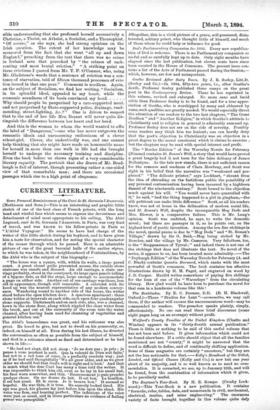CURRENT LITERATURE.
Some Personal Reminiscences of the Cure de St. Germainl'Auxerrois. (Mathieson and Sons.)—This is an interesting and graphic little sketch of one of the best class of French priests, with the long head and wistful face which seems to express the devoutness and detachment of mind most appropriate to his calling. The Abbe Legrand, cure de St. Germain l'Auxerrois, in Paris, was very fond of travel, and was known to his fellow-priests in Paris as " L'Abbe Voyageur." He seems to have had charge of the writer of this little sketch during his boyhood, and to have given him a taste for observation, and for noting the special character of the scenes through which he passed. Here is an admirable picture of one of the great baronial halls of the earlier regime, to which he was taken, in the neighbourhood of Fontainebleau, by the Abbe who is the subject of this biography :— " The house was a square, with, within its walls, a large paved court. A great closed grille prevented access, the outside stone staircase was unsafe and disused. An old carriage, a state car- riage probably, stood in the courtyard, its large open panels telling of a bygone date, as did the steps, large enough to accommodate a page on either side. Another out of use carriage was there, less old in appearance, though still venerable. A cabriolet with its hood up was the nearest representative of any modern convey- ance. Wandering round to another side of the house, the writer stood before the open kitchen door. A spacious apartment : three stone tables at intervals on each side, each upon four quadrangular stone supports. Underneath and on each side, also, was a channel, hewn in the stone floor, along which rippled the clear water from the brook, and out at the extremity of the room into the water channel, after having been used for cleansing of vegetables and general kitchen use."
The Abbe's benevolence was great, and his reticence was also great. He loved to give, but not to dwell on his generosity; or, indeed, on himself at all. Even during his last illness, he diverted the conversation as often as possible from the subject of himself, and died in a reticence almost as fixed and determined as he had shown in life :— " He had not slept. did not sleep : Je ne dors pas ; je prie ; je pease vous pendant la nuit Quo la volonte de Dien soit faite,' but not in a sad tone of voice, in a perfectly resolute way; just as if he had said thoughtfully 'We all grow older, and as we grow older we should feel that God's will is right and is best.' And that is much what the dear Cure has many a time told the writer. It was impossible to think him old, even as he lay in his small bed, his face worn somewhat, and thin. Heureusement je puis prendre quelque chose. On me donne du lait. Ii eat bon. Le bouillon, il set bon anssi. Et le cocoa. Je le trouve bon.' It seemed so hopeful. He was thin, it is true. He scarcely looked tired. His eye was good, his glasses lay just before him upon the sheet. His voice was firm, and hearing perfect. The inflexions of the voice were just as usual, and in those particulars no evidence of failing power was perceptible."
Altogether, this is a vivid picture of a grave, self-possessed, disin- terested, solitary priest, who thought little of himself, and much of those whom he could help or influence for good.






































 Previous page
Previous page